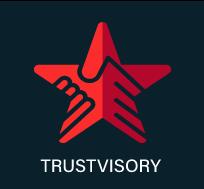Red Knights Defending Integrity: Confronting Misinformation, Debunking Disinformation, Fraud, and Unethical Practices in Immigration Services
SummaryThis article advocates for respect, equity, and collaboration in immigration practices, urging a shift from divisive rhetoric toward addressing real issues like fraud and unethical activities. It critiques organizations and media for unfairly targeting Regulated Canadian Immigration Consultants (RCICs), calling for greater professionalism, accountability, and fact-based discourse. Highlighting an investigation into fraudulent LMIA advertisements, the article details the reclamation of the domain pacific-immigration.ca by Trustvisory Ltd. to prevent further scams, educate the public, and support authorities in combating fraud. It It emphasizes unity, ethical practices, and collective action to build a fair and inclusive immigration ecosystem. This article is published as part of the "Red Knights" series, which focuses on advocacy, fraud prevention, and investigative reporting.
Advocating Respect, Collaboration, and Equity in Immigration Practices
In pursuing a fair and inclusive immigration ecosystem, fostering mutual respect, collaboration, and equity among all stakeholders is imperative. Professional supremacy, prejudice, and derogatory rhetoric have no place in constructive discourse. This message calls for unity, accountability, and a focus on addressing real challenges, emphasizing the importance of professionalism, ethical journalism, and a collective effort to build a stronger and more equitable future. Since we launched the initiative, 500+ RCICs have joined us, which further reinstates the need for a system like Trustvisory. By the end of this investigative article, readers will understand the significance of these messages, and we firmly request an immediate and unequivocal apology to ethical and hardworking RCICs from CILA, the media, and public servants.
A. Message for Organizations such as CILA and Public Servants
- Equality Over Supremacy: Supremacy—whether professional or otherwise—is unacceptable. If you’ve studied law, please also study history and the fundamental principles of equity.
- Respect for All Professions: Demonizing or belittling an entire profession with derogatory language is unprofessional and condemnable. Mutual respect is the cornerstone of constructive dialogue.
- We demand an immediate apology: We demand an immediate apology: Irresponsible behavior or statements directed at others demand genuine and unequivocal apologies. Failing to address these actions causes irreparable harm and puts many hardworking regulated consultants in danger. Many regulated consultants operate outside Canada; conflating them with unethical professionals, unauthorized practitioners, and scammers places their safety at serious risk.
- Be a Part of the Solution: If you are not contributing positively to resolving challenges, please refrain from exacerbating the problems.
- Collaborative Approach: Advocacy that unfairly targets fellow professionals only empowers scammers and unethical practitioners. It’s time to move beyond an “us vs. them” mindset and adopt a collaborative approach for the greater good.
- Equality in Democracy: In a democracy, all individuals and professions are equal. No profession holds inherent superiority. Blind prejudice undermines collective progress.
- Knowledge Is Key: If gaps in understanding exist, take the time to research and educate yourself rather than perpetuating misconceptions.
- Addressing Real Issues: Human trafficking, modern-day slavery (e.g., LMIA abuse and fraudulent job offers), illegal activities like buying and selling of job offers, document fraud, immigration system circumvention, and other criminal activities are pressing challenges. Let’s focus on addressing these real issues and work towards actionable solutions.
- Mutual Respect Is Essential: The continued targeting of Regulated Canadian Immigration Consultants with derogatory labels is unacceptable. If such behavior persists, we reserve the right to respond proportionately, including identifying organizations as “Consociatio Non Grata” and individuals as “Persona Non Grata.”
- Building a Better Future: Let’s collaborate as partners, not rivals, to create a stronger, more equitable, and inclusive Canada. As Regulated Canadian Immigration Consultants, we are fully aware of the issues. We are taking the lead as “Red Knights “(Ethical Regulated Canadian Immigration Consultants identified by their red insignia) to eliminate this scourge. You are welcome to follow and collaborate with us. We love and care about you; you are one of us. Please do not hate us because of our profession or refer to us with derogatory names.
B. Message for Media
In addition to the points above, we recognize that media is the fourth pillar of democracy. We expect more due diligence from the Toronto Star. We have carefully reviewed your policy on publishing "opinions" in your newspaper, and your glossary and editorial standards. While everyone has the right to express their opinions, deviations from factual accuracy come with significant caveats:
- Standards of Libel and Fair Comment: Opinions must adhere to legal and ethical standards. Writers cannot fabricate facts or make irresponsible, sensational claims without evidence, even within opinion pieces.
- Right to Response for Affected Parties: Your commitment to the The Trust Project is commendable, but it seems on one of its eight Trust Indicators, you have failed:
- Diverse Voices: "What are the newsroom’s efforts and commitments to bring in diverse perspectives across social, ideological, and demographic differences? Are some communities or perspectives included only in stereotypical ways, or even completely missing?"
As Regulated Canadian Immigration Consultants (RCICs), we increasingly feel marginalized and subjected to unwarranted criticism. While every profession faces challenges, labeling an entire community of professionals with derogatory terms such as "bad consultants" or "scumbags" is not only unfair but also harmful. Furthermore, the lack of effort to include our perspective contradicts the principles of democracy and ethical journalism.
Elaborated word-word Analysis of Two Paragraphs in the CILAs Article
We shall be analyzing more paragraphs word by word, but let's start with these two paragraphs:
Statement(s)
“One increasingly common practice is for bad consultants to sell fake job offers via Labour Market Impact Assessments (“LMIAs”) to victims seeking employment in Canada or to existing temporary residents desperate to find a way to remain in this country. A cursory search on Kijiji and social media with the phrase “LMIA” (Labour Market Impact Assessment) shows these platforms are rife with consultants selling LMIAs, which is not only unethical, but also illegal.”
"While not all immigration consultants engage in this kind of behaviour, we still see far too many cases of consultants — or people calling themselves consultants — taking advantage of would-be immigrants to this country. Miller can’t solve this problem overnight but there are a number of things he can do to crack down on the industry, starting with the professional association his own government initiated."
- https://cila.co/cila-in-toronto-star-discussing-how-we-can-better-protect-the-public-from-unscrupulous-immigration-behaviour/
- https://www.thestar.com/opinion/contributors/too-many-consultants-are-taking-immigrants-to-canada-for-a-ride-justin-trudeaus-government-can/article_dd2b8a10-a8ef-11ef-b4ea-8f385cb5f83f.html
1. “Increased” and “Common” Practice of Selling Fake Job Offers, Bad Consultants
The article asserts that selling fake job offers is an "increasingly common" practice among immigration consultants. This claim raises two key issues:
- Lack of Data: The terms "increased" and "common" imply a measurable trend, yet the article provides no statistical evidence. Without hard data, the claim becomes speculative.
- Overgeneralization: Using a blanket statement, the article risks applying a "one-size-fits-all" approach. Are these practices attributed to all consultants? Or only to a subset? The lack of specificity undermines the credibility of the assertion.
This kind of language, while dramatic, is insufficient for serious accusations that could impact the reputation of an entire profession.
2. Increased + Common = Majority or Keyword Stuffing?
The combination of "increased" and "common" implicitly suggests that most of Licensed immigration consultants are involved in unethical practices. However, the article does not:
- Define what percentage constitutes "common."
- Provide historical benchmarks or trends to demonstrate an "increase."
This pairing of terms could also reflect keyword stuffing, a tactic often used to create a sense of urgency or crisis without providing sufficient evidence. The lack of quantified data suggests the article aims to sensationalize rather than inform.
3. No Differentiation Between Licensed Consultants, Unauthorized Practitioners, and Scammers
One of the most critical flaws in the article is its failure to differentiate between Licensed Immigration Consultants, Unauthorized Practitioners, and Scammers:
- Licensed Consultants: These professionals are regulated by the College of Immigration and Citizenship Consultants (CICC) and must adhere to strict ethical and professional standards.
- Unauthorized Practitioners: Individuals who operate without licensing, often under ambiguous titles like "visa expert."
- Scammers: Fraudulent actors who use fake credentials and deceptive practices to exploit vulnerable immigrants.
This conflation may stem from ignorance or an ulterior motive to undermine the credibility of licensed professionals. Without clear distinctions, the article risks misleading the public and damaging the reputation of legitimate consultants who provide vital services.
4. “Cursory Search” on Kijiji and Social Media
The phrase "cursory search" signals a superficial investigation. Here's why this is problematic:
- Limited Scope: A brief search on platforms like Kijiji cannot capture the complexities of fraudulent activities. The platform might host bad actors, but this doesn’t implicate the entire profession.
- Jumping to Conclusions: Using anecdotal findings to draw broad conclusions about the industry reflects a lack of rigor. A proper investigation would involve cross-referencing ads with CICC databases and contacting advertisers for verification.
- Bias Reinforcement: A "cursory search" suggests confirmation bias—seeking evidence to fit a preconceived narrative rather than conducting an objective analysis.
5. Use of “Rife” to Describe Consultants Selling LMIAs
The word "rife" is particularly loaded, suggesting abundance and prevalence without providing supporting evidence:
- Amplifying Fear: Words like "rife" create a sense of alarm, making it seem fraudulent practices are widespread among Licensed consultants.
- Reinforcing a Narrative: By pairing “rife” with “consultants,” the article directs blame primarily at regulated professionals, ignoring the role of unauthorized practitioners and scammers.
Such language is inflammatory and unfair without verifiable data supporting the claim.
6. “Not All Immigration Consultants Engage in This Behavior” – But Who Does?
The article acknowledges that "not all immigration consultants" are involved in fraud but fails to clarify:
- Who are the perpetrators? Are they licensed consultants, unauthorized practitioners, or scammers?
- What types of fraud are being committed? Selling fake LMIAs vastly differs from legitimate consultancy practices, yet the article lumps these together.
By grouping licensed consultants, unauthorized practitioners, and even human traffickers, the article:
- Implies a shared culpability across all groups.
- Erodes public trust in legitimate professionals who are bound by regulatory standards.
This lack of nuance perpetuates confusion and harms the reputation of ethical professionals.
7. “People Calling Themselves Consultants”
The phrase "people calling themselves consultants" is vague and misleading:
- Terminology Mismatch: Many unauthorized actors label themselves as "visa experts" or even "immigration lawyers" rather than "consultants." This critical distinction shows that not all fraud originates within the consulting profession.
- Misuse of CICC and Government Logos: Some scammers falsely use CICC or ICCRC logos to appear credible. This is because:
- The brand visibility of CICC is higher than that of law societies.
- There is a need for stricter enforcement and public awareness about verifying credentials.
The article conflates scammers with licensed professionals by failing to clarify these points, unfairly damaging the latter's credibility.
Findings from Our Investigation: Sequence of Events
With all the keywords mentioned in the article, we began an independent search for instances of fraudulent LMIA (Labour Market Impact Assessment) advertisements on platforms like Kijiji. We conducted this investigation using analytical means, as we believed the claims warranted deeper scrutiny. Undeniably fraudulent activities need to be addressed, but rigorous investigation is necessary to separate fact from conjecture. Here's the sequence of events from our investigation:
1. Initial Search on Kijiji
We started the search on Kijiji using the keyword LMIA. We found 88 advertisements. These advertisements were triggered as they used keywords such as “Help with LMIA,” “LMIA provided if needed,” "I need an LMIA," “If need LMIA will provided,” and “LMIA available,” in thier adverts. We analyzed these ads by category and identified several patterns:
Sector-wise Breakdown:
- Transport and Related Sectors: 46 ads
- Trucking companies, tow truck drivers, truck mechanics, and long-haul drivers were included.
- Notable findings:
- Trucking Company 01: 5 ads
- Trucking Company 03: 8 ads
- ........................................................
- Trucking Company 14: 1 ad
- Trucking Individual & Long-Haul Truck Driver: 13 ads
- Restaurant and Food Sector: 8 ads
- Positions include restaurant manager, kitchen helper, barista, and food service supervisor.
- Some ads explicitly mentioned LMIA support, while others were vague. Note: LMIA support does not mean they are selling LMIAs, many employers struggle to find resources and they use this terminology to attract Foreign Workers inside Canada.
- Miscellaneous Jobs: 5 ads
- Examples included a retail sales supervisor, general laborers, and framers for construction companies.
- Immigration Companies: 29 ads
- 2303900 Alberta Inc. (Pacific Immigration)- 22 ads
- Email [email protected] was flagged for being visually deceptive.- 1 ad
- Licensed Immigration Professional 01- 1 Ad
- Licensed Immigration Professional 02- 3 Ads
- Licensed Immigration Professional 03- 2 Ads
Policy
We maintain a Zero Tolerance Policy for fraudulent or unethical activities and have launched the Zero Trust Index initiative. If Licensed individuals 01 to 03 are also found engaging in such misconduct, their profiles will be flagged and listed in the Zero Trust Index List of Licensed Professionals. Recognizing that time is of the essence, this initiative ensures public protection even before a formal complaint is lodged with regulatory bodies. It enables us toto monitor licensed professionals—consultants or lawyers passively to safeguard the public interest.
Who grants us this authority? It stemsfrom our role as regulated professionals and the most important stakeholders in any true democracy: "ordinary citizens". In a democracy, citizens hold more power than any public servant, association, or other body.
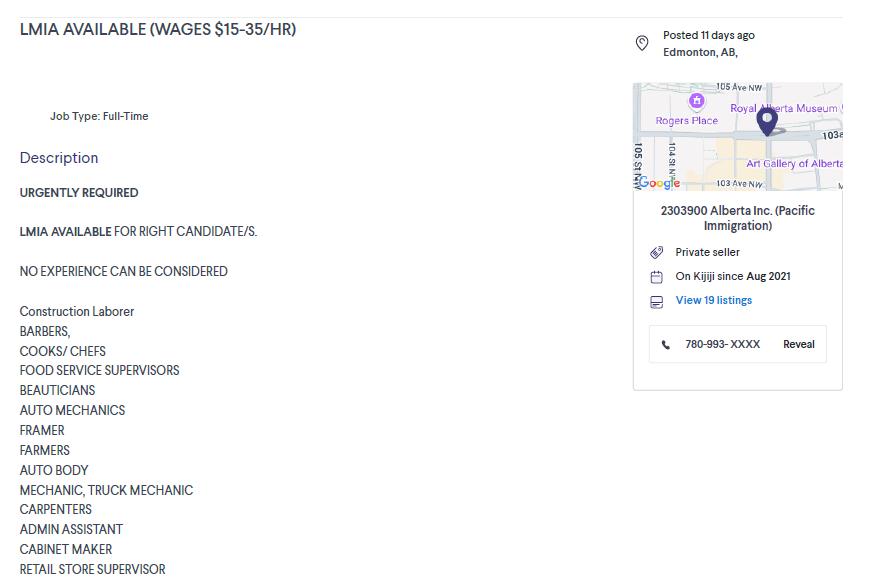
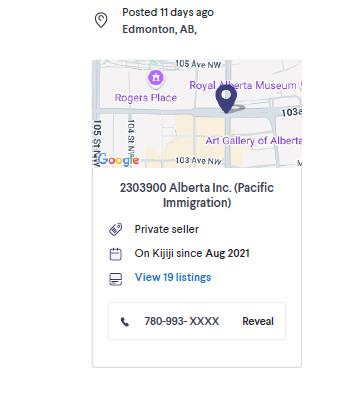

2. Transition to an “Actual Search”
Recognizing the limitations of a cursory search, we escalated to a more thorough investigation:
- Cross-referencing CICC Database:
- We searched for licensed immigration consultants using CICC’s open database.
- No matches were found for names and emails such as Pacific Immigration
- Filtering “Pacific Immigration” Matches:
- The name yielded 21 results in CICC’s database. By negating locations, phone numbers, and websites, we confirmed no exact matches related to Edmonton-based entities of that name.
3. Investigation into “Pacific Immigration”
From Kijiji Advertisements, here is the initial information that we gathered.
Contact Information:
Name: Unkown
- Phone Numbers: 780-993-9399, 780-263-5409.
- Email: [email protected].
3. Domain Analysis of "pacific-immigration.ca"
We purchased a historical report on domain ownership and usage. Our goal was to identify digital footprints to to verify the facts further.
Domain Analysis: Historical data revealed the domain pacific-immigration.ca was last active on December 16, 2023. The domain appeared to have been used exclusively for email communications without an active website, suggesting a proxy or parallel agency setup.
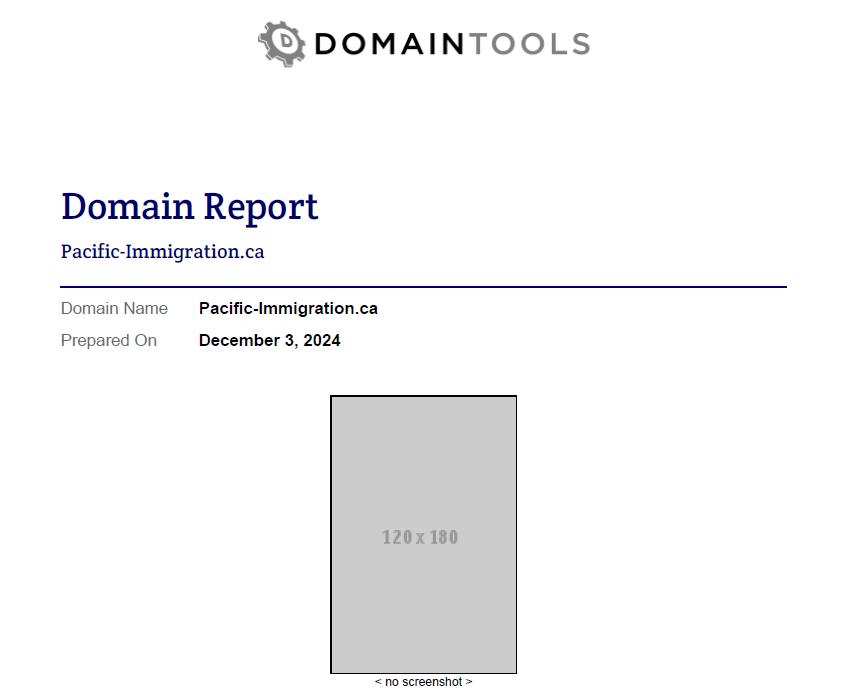
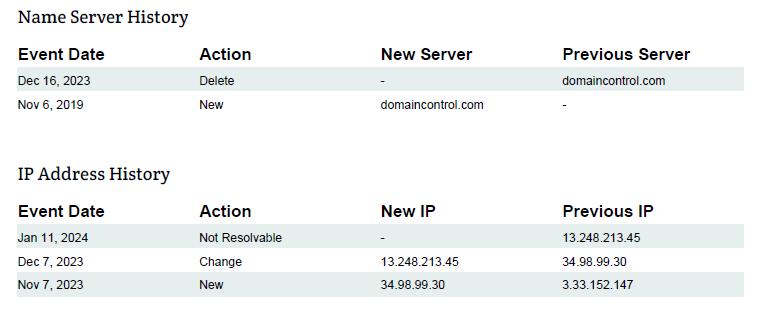
4. Social Media Discovery
We did a basic Google Search the data we had.
We found two Facebook pages associated with Pacific Immigration Services:
- Page 1: 70+ followers.
- Page 2: 1.5K followers.
Both pages labeled their operators as "lawyers," though no verifiable credentials were provided. Despite this, they also actively used the "ICCRC Certified" logo to appear credible.
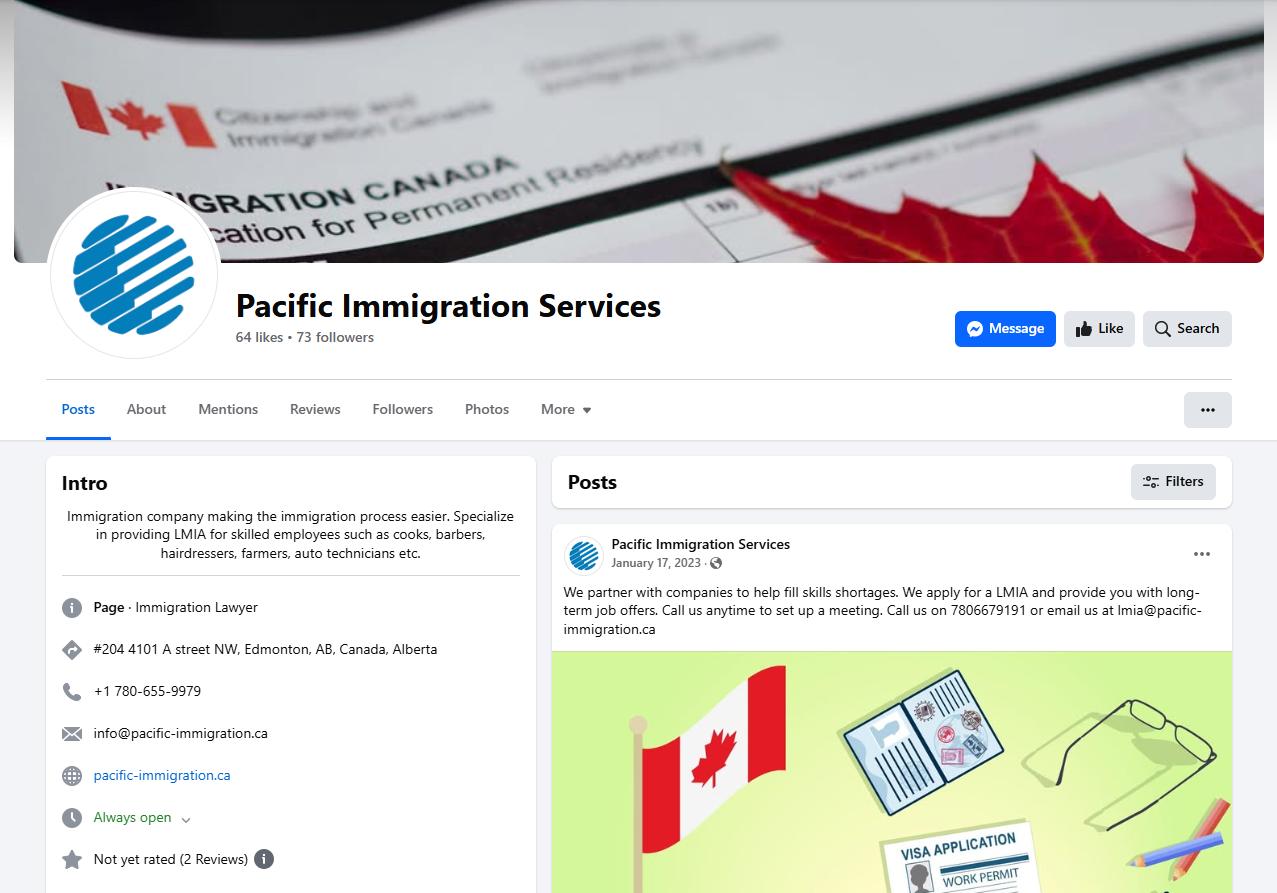
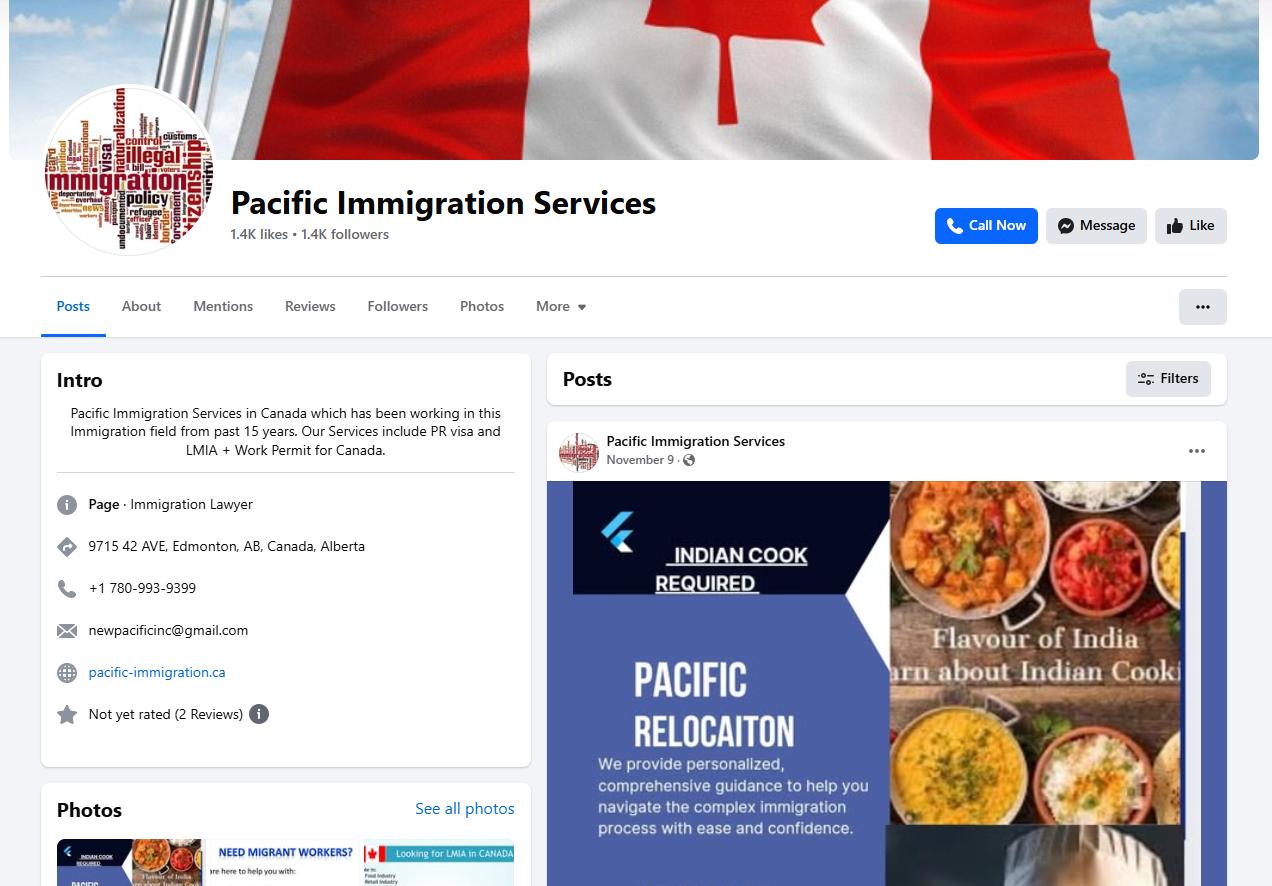
Keywords Uncovered:
- New terms such as "Pacific Relocation" and "Pacific Relocation Services" emerged on Pacific Immigration Pages, and specific names of individuals emerged during this search.








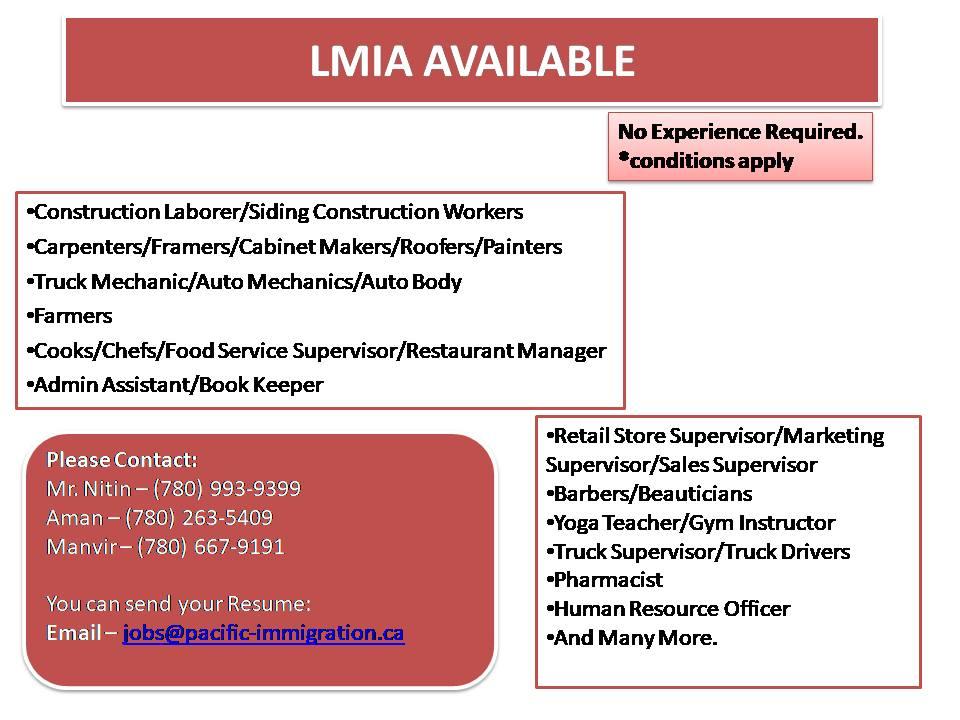

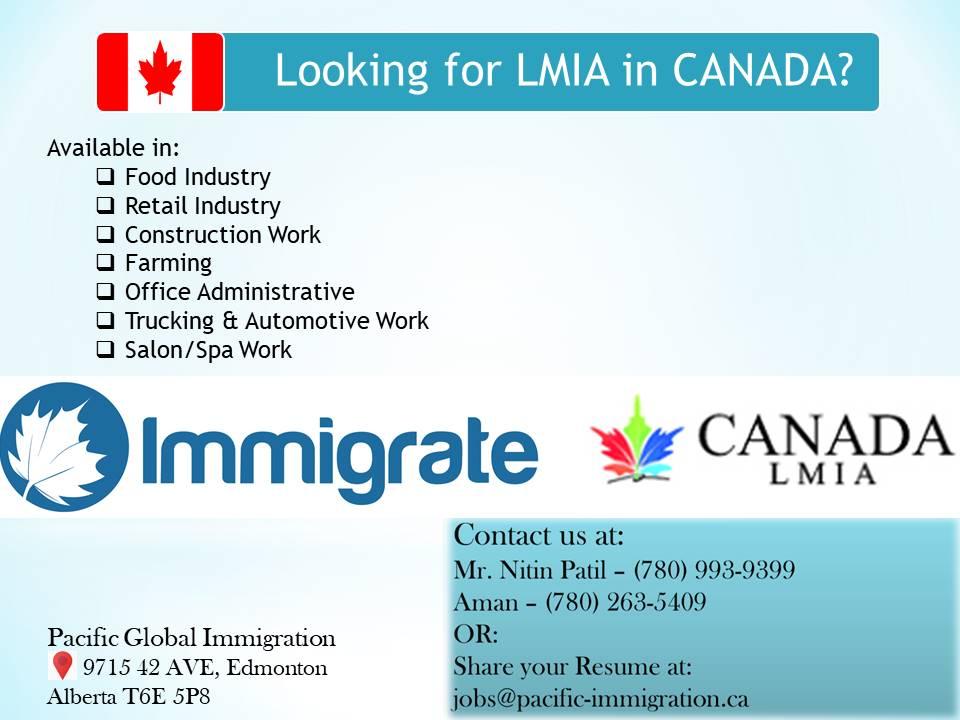

5. Cross-Referencing New Leads
We identified names and contact details associated with the fraudulent entity:
- Nitin Patil aka Nitin Patel: +1-780-993-9399 / +91-9307308843. - 12 times
- Aman: 780-2XX-XXX.
- Manvir: 780-6XX-XXX.
- Sana: 587-5XX-XXXX.
Upon further investigation:
- No matches for Nitin Patil or Nitin Patel were found in the CICC database.
- Comparing logos from Nitin Patil’s LinkedIn profile and Facebook pages confirmed they were identical, indicating the same entity was behind these fraudulent operations.
- From archives, we found them to be operating way before 2024, around 2018-2019.
- They run operations in multiple countries.

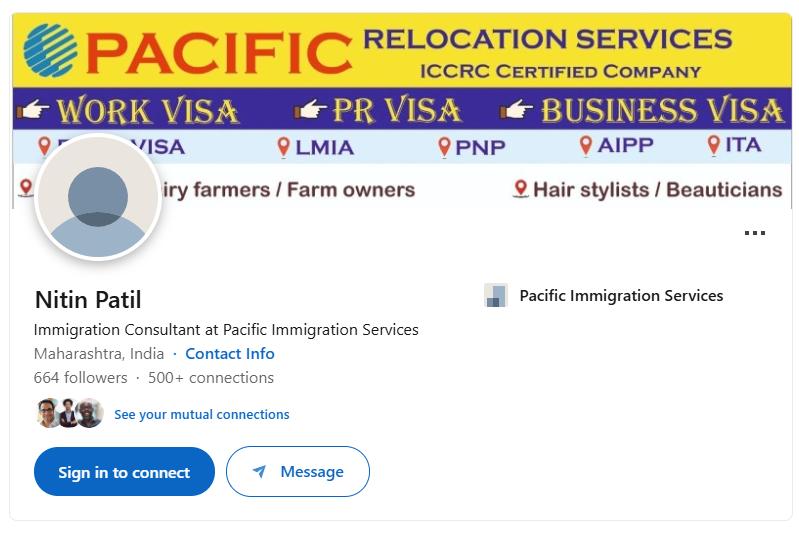
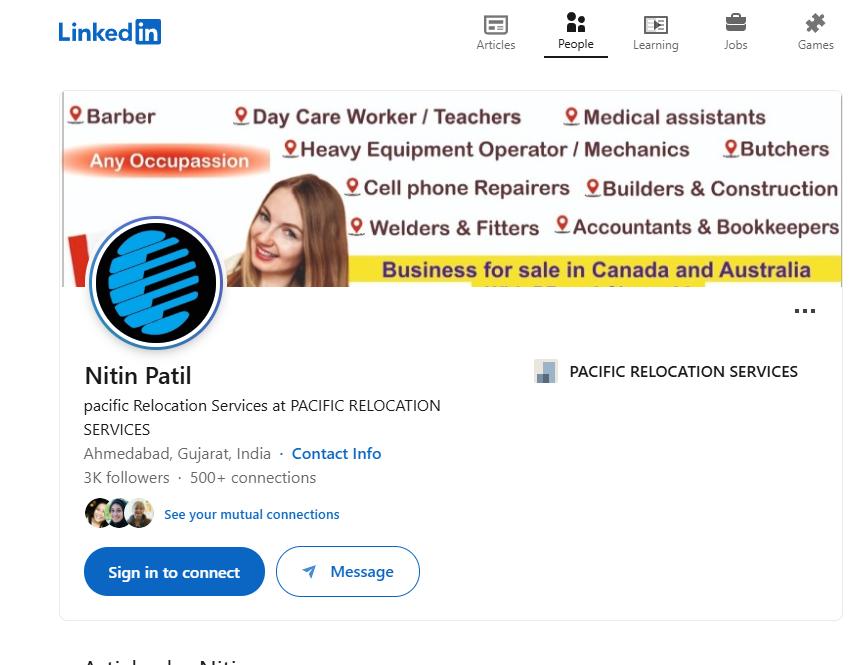
6. Corroborating Evidence
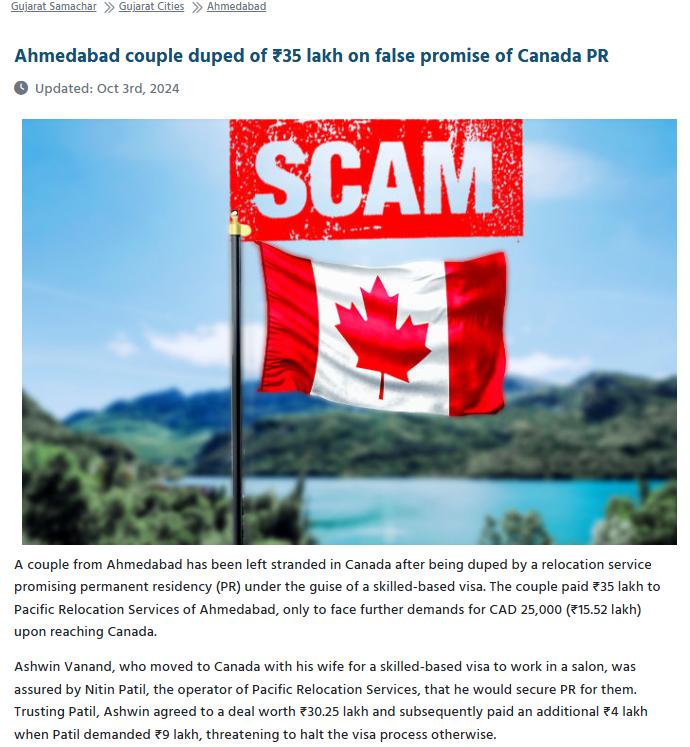
Additional evidence reinforced the fraudulent nature of these activities:
- A news article from Gujarat Samachar reported a couple duped of ₹35 lakhs (~CAD 57,000) by "Pacific Relocation Services." This matched the details of Nitin Patil and the related scams.
- Another news article from Gujarat Samachar reported a woman duped of ₹8 lakhs (~CAD 13,000) by "Pacific Relocation Services." This matched the details of Nitin Patil and the related scams. It even mentions document-related scams.
- Consistent phone numbers, email addresses, and logos across platforms established a clear link to the fraudulent entity.
7. Locations
We also found out about their other office locations.


Transforming a Domain Used to Commit Fraud into a Public Safeguard: Turning Tides-The Trustvisory Approach
1. Acquisition of the Domain and its Takeover by Trustvisory Team
After confirming that the domain pacific-immigration.ca was inactive, we recognized it as a critical asset previously exploited for fraudulent activities. To mitigate further misuse:
- The domain was purchased under Trustvisory Ltd., a non-profit organization dedicated to protecting public interests in immigration services, on December 3, 2024.
- This swift action ensured that scammers could no longer use the domain to deceive unsuspecting individuals, effectively cutting off a key tool in fraudulent operations.
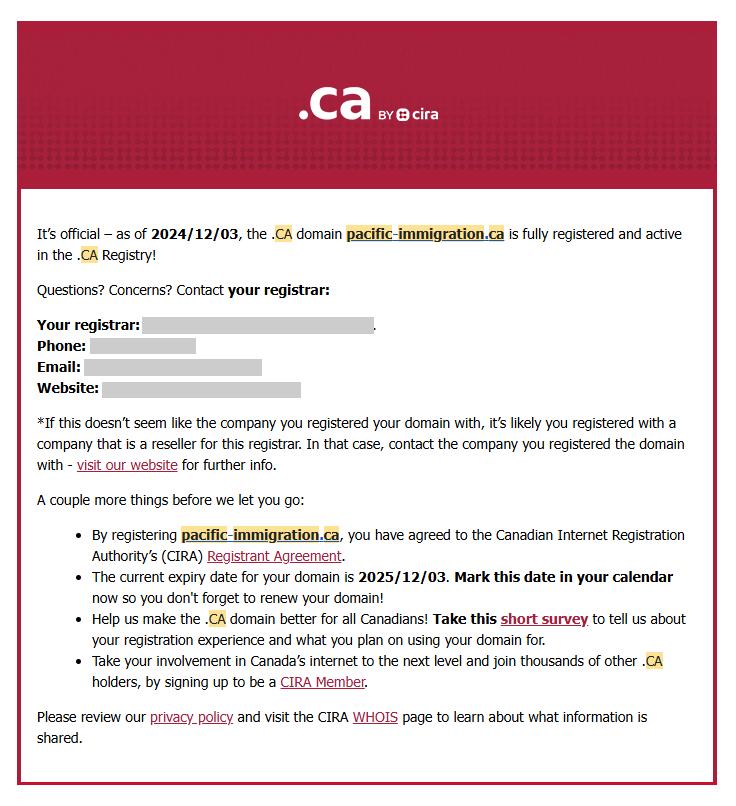
2. Autoresponder Implementation
To address ongoing fraudulent communication, we implemented the following measures:
- An email service was established on the domain to intercept all incoming communications.
- A comprehensive autoresponder was set up to:
- Notify senders about the domain’s history of fraudulent use.
- Redirect them to legitimate resources verifying licensed immigration consultants. Ask victims or people who have more information to come forward.
- We have implemented "Catch All Email System". Any kind of Email id like [email protected], [email protected] etc. will be caught.
This proactive measure ensures that potential victims are informed and provided with tools to verify authenticity, preventing further exploitation by unauthorized practitioners and scammers.
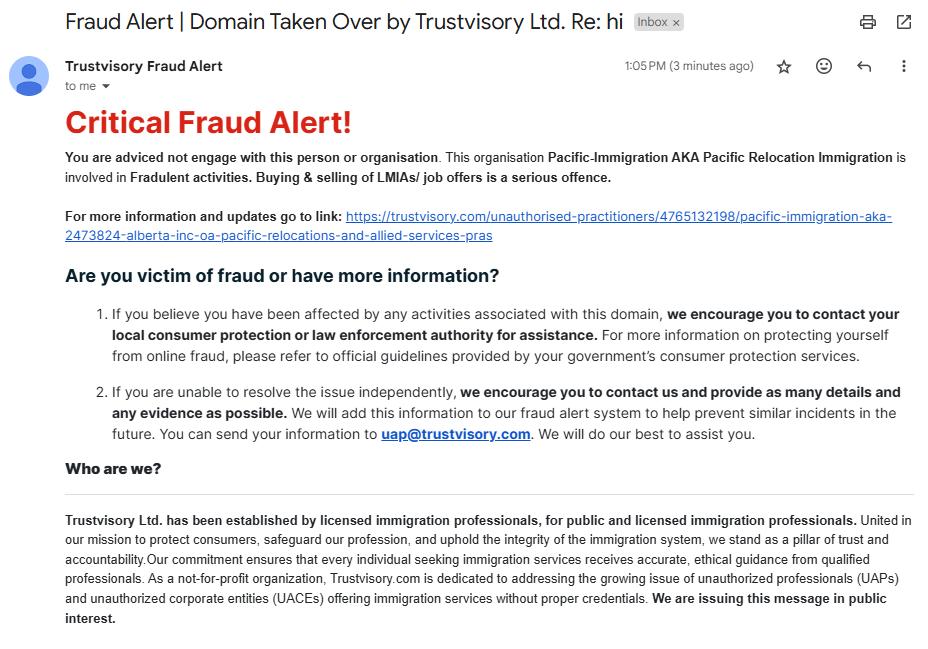
3. Hosting an Educational Message
We hosted a Domain Takeover Notice on the domain's homepage to safeguard the public. This notice serves as an educational resource and includes the following:
Message Hosted on the Domain:
Domain Ceased Notice
The domain you attempted to access has been deactivated and is no longer operational. This domain was associated with activities in violation of applicable laws and regulations. It was used to commit fraudulent activities, misleading the public and and potentially compromised user trust and security.
Are You a Victim of Fraud?
If you believe you have been affected by any activities associated with this domain, we encourage you to contact your local consumer protection authority or law enforcement authorities for assistance. For more information on protecting yourself from online fraud, please refer to official guidelines provided by your government’s consumer protection services.
How to Report Fraud:
If you are unable to resolve the issue independently, we encourage you to contact us and provide as many details and any evidence as possible. We will add this information to our fraud alert system to help prevent similar incidents in the future. You can send your information to [email protected]. We will do our best to assist you.
Who We Are:
Licensed immigration professionals for public and licensed immigration professionals have established 12876680 Canada Association O/A Trustvisory Ltd. United in our mission to protect consumers, safeguard our profession, and uphold the integrity of the immigration system, we stand as a pillar of trust and accountability.
Our commitment ensures that every individual seeking immigration services receives accurate, ethical guidance from qualified professionals. As a not-for-profit organization, Trustvisory Ltd. is dedicated to addressing the growing issue of unauthorized professionals (UAPs) and unauthorized corporate entities (UACEs) offering immigration services without proper credentials.
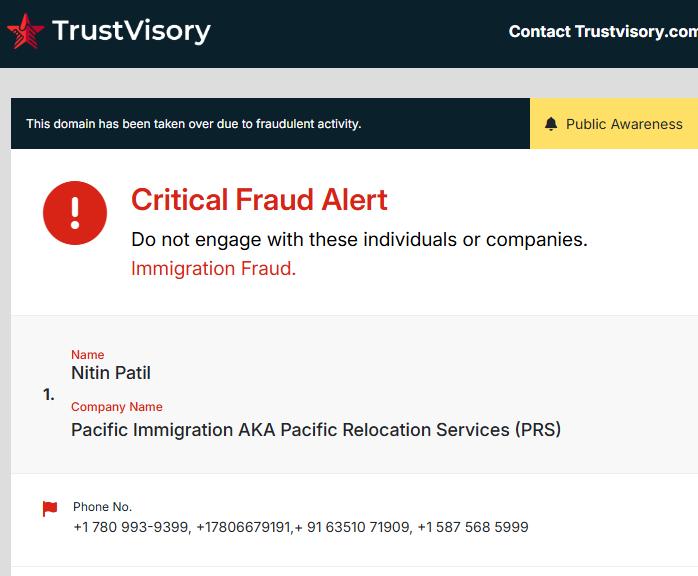
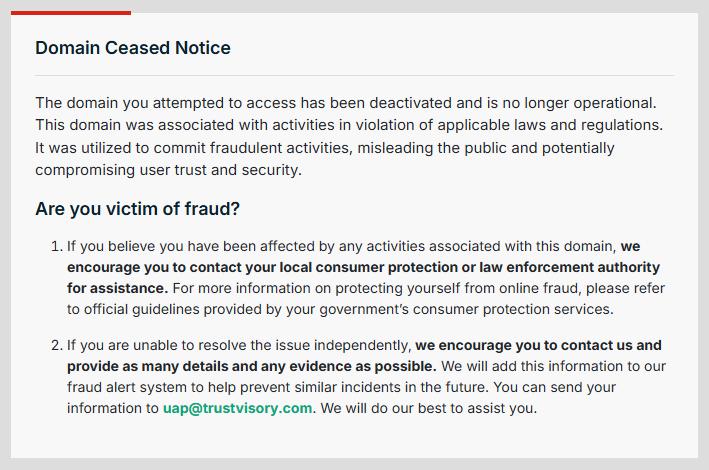
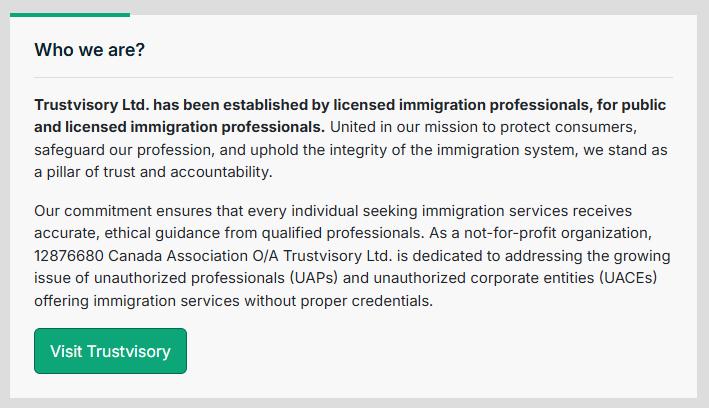
4. Continuous Monitoring and Lead Gathering
To maintain the domain as an active resource for public protection, we implemented daily monitoring to:
- Capture incoming emails and messages, often including valuable details about fraudulent schemes and operations.
- Analyze patterns in fraudulent activities to identify additional connections and new scams.
This ongoing monitoring transforms the domain into a hub for intelligence gathering, which can be shared with regulatory bodies for enforcement actions.
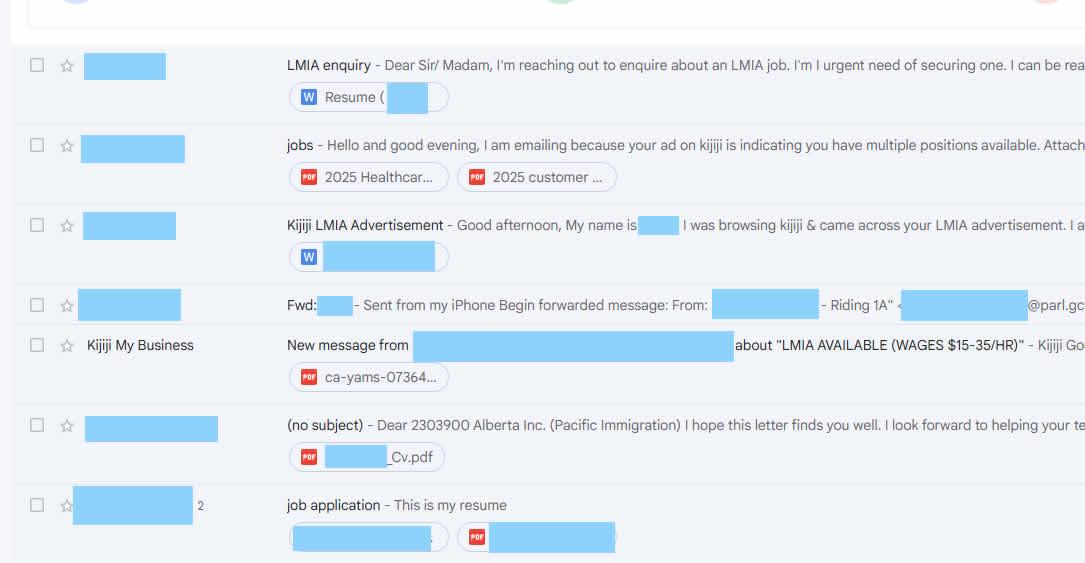
From Data to Action: Tackling Fraud with Impactful Reach and Statistics
1. Real Statistics
Our efforts have reclaimed the fraudulent domain and significantly turned it into a tool to safeguard public interests. Here’s how the numbers highlight our impact:
- One-Fourth of Total Ads on Kijiji: Among the Immigration companies posted ads identified on Kijiji, 22 out of 29 (75%) originated from this single domain, demonstrating its pivotal role. By taking control of the domain, we neutralized a substantial portion of fraudulent activity.
- Absolute Majority: With 75% of related ads tied to this domain defunct, our actions target the issue's core, marking a critical intervention in the fight against unauthorized practitioners. Out of 88 ads with LMIA as a keyword, 22 are neutralized that is 25% of the total.
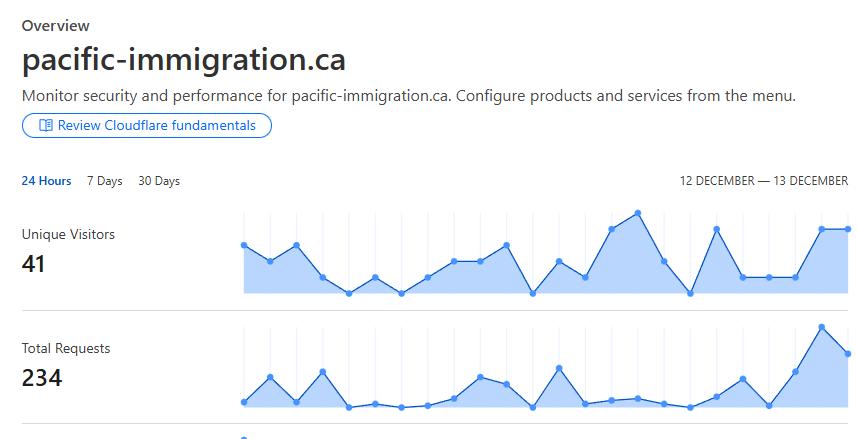
2. Wider Reach and Influence
- The scammers used this domain not only on Kijiji but across social media platforms and various online channels. Its pervasive misuse underscores the importance of our intervention.
- Google already indexed the domain, amplifying its reach and making it a key point of contact for potential victims. Instead of misleading information, it serves as a hub of accurate guidance and public protection.
3. Impactful Transformation
The reclaimed domain is actively relaying its Domain Ceased Notice message across platforms where it was previously used for fraudulent purposes. By leveraging its indexed status, the domain ensures its visibility directs individuals towards legitimate resources, further safeguarding the public and reinforcing trust.
This transformation demonstrates how reclaiming and repurposing key assets can significantly disrupt fraudulent operations and provide accurate information to those most at risk.
4. How Our Actions Protect the Public
a) Prevention of Future Fraud:
- By acquiring the domain, we closed a critical avenue used by scammers to mislead the public.
- Any attempts to use the domain for fraudulent purposes are intercepted and neutralized.
b) Public Awareness and Education:
- The hosted Domain Ceased Notice ensures that anyone visiting the site is made aware of its past misuse and learns how to verify consultants’ credentials properly.
- The educational content enhances public understanding of online fraud and how to avoid it.
c) Collaboration with Authorities:
- Information gathered through the domain’s email and alert systems will be shared with regulatory bodies like the CICC, CBSA, and law enforcement, enabling them to take action against broader fraud patterns.
d) Empowering Victims:
- Victims contacting the domain are directed to legitimate resources for protection and resolution, helping them seek redress and avoid further scams.
e) Transparency and Accountability:
- We demonstrate our commitment to transparency and public trust by hosting a clear and informative notice.
- Visitors are reassured that the domain is now responsible for safeguarding their interests.
Conclusion
We advocate for a united, evidence-based approach to tackling fraud and unethical practices in the immigration sector. The Article underscores the importance of professionalism, respect for all professions, and collaborative efforts to address systemic issues. By repurposing a fraudulent domain, Trustvisory Ltd. demonstrates a proactive, impactful model of public protection and accountability. The message is clear: fair immigration practices require partnership, not division, and a focus on addressing the root causes of fraud while safeguarding ethical practitioners and the public.

